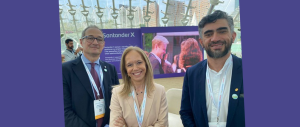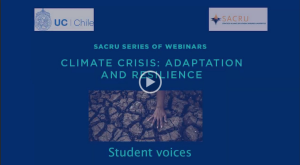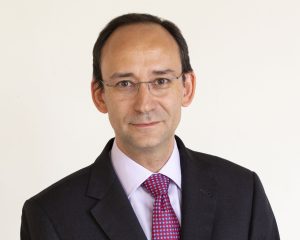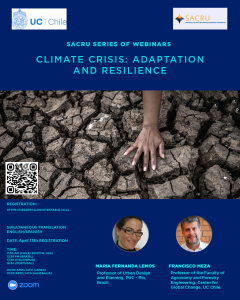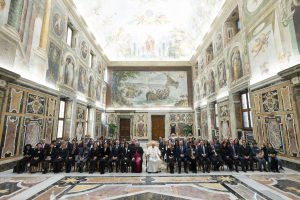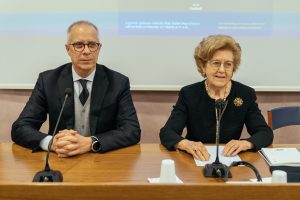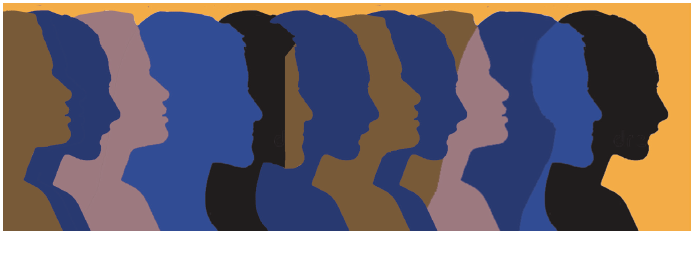Reflections for the
International Day of Multilateralism
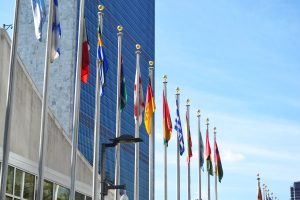
The Global Day of Diplomacy for Peace is celebrated by the United Nations every 24th April. Experts from the Strategic Alliance of Catholic Research Universities have provided insights into the value of international cooperation
In 2018, the General Assembly of the United Nations adopted Resolution 73/127, which officially instituted the International Day of Multilateralism and Diplomacy for Peace. This recurrence aims to celebrate the founding principles of multilateralism, such as consultation, inclusion, solidarity, and their role in promoting the United Nations’ three pillars of peace, sustainable development, and human rights.
Inspired by its mission of global cooperation for the Common Good, the Strategic Alliance of Catholic Research Universities (SACRU) has collected insights from its experts to focus multilateralism’s relevance for addressing global and multifaceted challenges. SACRU is a network composed of eight Catholic Universities from four different continents. The contributions represent the personal views of individual academics and are not intended as the official positions of SACRU and its partner Universities.
Universitat Ramon Llull (Spain)
Written by Oscar Mateos, delegate of the Rector of the URL for the promotion of the 2030 Agenda
We need a strong civil society to foster
a democratic and effective multilateralism
At a time when our global village needs more than ever global institutions and mechanisms capable of dealing with problems of an increasingly transnational nature, multilateralism has entered a critical phase. The new wave of “nativism” advocating the idea of “my country first” questions the need for such mechanisms. Moreover, the increasingly securitarian context, exacerbated by Russia’s invasion of Ukraine, has returned to a logic of rearmament and militarisation that compromises the other logic of peacebuilding or diplomacy as the main responses.
However, two facts highlight the need for effective and inclusive multilateralism as never before. On the one hand, the problems that most condition and compromise our lives, in any part of the planet, are problems “that do not understand passports”, as the late former UN Secretary General Koffi Annan once reminded us. Only a well-articulated multilateralism, therefore, will be able to deal effectively with the effects of the climate crisis, the effects of future pandemics, or the revived challenges posed by the nuclear threat. On the other hand, it should not be forgotten that our multilateral institutions, which are the legacy of the Second World War, must be more inclusive, participatory and democratic, proportionally incorporating the voice of a global South that is on the rise, or of civil society organisations at the international level, in a world that no longer belongs to states alone.
Precisely, the active role of a critical global citizenry is key to being able to promote a new paradigm of a more inclusive multilateralism that puts the voice of people and societies at the centre. Universities have much to say and contribute to the construction of this critical global citizenship that aspires to transform our world and which is also key to promoting the longed-for multilateralism.
Boston College (United States of America)
Written by David Deese, Department of Political Science
US Diplomacy and multilateralism toward China and East Asia
Does the “hyper vigilance”, if not hostility, of many US politicians and thought leaders toward China serve to advance US interests and values, or global public goods such as security, financial stability, prosperity, ecological balance, and human rights? Are US, Pacific Basin, and global security and cooperation improved by ever more consistent exaggeration of Chinese capabilities, intentions, and “threats” by US leaders and media? Likewise, are human rights in China, China’s provocative actions toward smaller east Asian states, or North Korea’s nuclear and conventional weapons provocations effectively addressed by assuming an ever more cold war US posture toward China in our diplomacy? Even among the public intellectual community, a typical recent article was entitled “China’s Hidden Tech Revolution: How Beijing Threatens US Dominance” (Wang 2023).
Indeed, it can be argued that the US and China have several crucial areas of overlapping, if not common, fundamental interests—from secure sea lines of communication to east Asia from the Middle East, US, and Latin America, to a stable Pacific Basin, balancing Russian assertiveness and restraining its provocative actions, stabilizing the international financial system, minimizing destabilizing actions by North Korea, supporting critical manufacturing and rare earth supply chains, mitigating the climate crisis, reducing global poverty levels, commercializing new technologies, attracting talented Chinese students to US universities (and specifically in natural science and engineering) from the bachelor to doctorate levels, and holding sports and cultural exchanges.
Instead of framing China’s rapid progress in many key areas as a threat, it might be helpful to understood it as a useful challenge, if not an opportunity, for the US to reconsider and renovate some of its own practices and policies. Instead of framing China’s key accomplishments as harmful to the US and West, we might work harder to discern the ways in which mutual benefits can be created. More specifically, it might be worth trying out a simple thought experiment by asking what if US and western diplomacy toward China and multilateral initiatives in the Pacific Basin were re-focused on enticing, even leveraging China, to cooperate? Since the US “tilt”, “pivot “ or “rebalance” toward the Asia Pacific in 2011-2012 under President Obama and Secretary of State Clinton, US diplomacy has been much more about challenging China than engaging it. In principle, Obama and Clinton’s approach was to strengthen bilateral security alliances, deepen relationships with emerging powers, including China, and engage with regional organizations. However, in practice the US approach was quite explicitly designed in ways that could only be perceived as threatening by Chinese officials and publics in the rapidly rising power of the Pacific Basin and well beyond.
The Trans -Pacific Partnership (TPP), or cornerstone of Obama’s economic policy in the Asia-Pacific, for example, was to include all of the major countries in the region (40 percent of the global economy) except China in a comprehensive, integrated economic area. US rhetoric was very much framed in terms of having the US “write” the rules for the global economy in direct opposition to China. Indeed, once leading US politicians from both parties opposed the TPP during the 2016 presidential campaign, the agreement was doomed, at least in terms of US engagement. Even as President Trump strongly criticized the TPP and withdrew the US in 2017, most of the other countries created their own version. By the time of Trump’s explicitly hostile stances toward China beginning in 2018, the Chinese pushed for a much less comprehensive regional economic partnership with 15 countries, to accompany their ambitious Belt and Road Initiative that focused on South and Central Asia This Chinese-led trade deal was agreed in late 2020, although India later pulled out, which substantially undercut its breadth and importance. Essentially, these US diplomatic and multilateral efforts aimed specifically against China ended up enhancing China’s position in the region and eroding US influence (McBride, et al. 2021).
The broader and deeper effects of what has become by 2023 “geopolitical fragmentation” of global capital flows, especially foreign direct investment, are not yet completely clear. The intentional movement of production home or to trusted countries is certainly likely longer term to slow worldwide economic growth, diversification, and resilience to economic and financial shocks (Ahn, et al. 2023). The effects on developing countries are likely to be the greatest in terms of reduced access to capital and technology, at a time when climate change mitigation and adaptation urgently require acceleration of these flows. In the US and western economies, the loss of inward foreign investment and competition from Chinese firms is likely to slow innovation and productivity improvements.
Presidents from Truman to Nixon recognized that mass US public opinion toward a foreign country is both a lever that they can sometimes manipulate to accelerate, and one that they must be careful not to accelerate out of control. Trump’s relatively hostile rhetoric toward China from 2018 through 2020, as well as after his presidency, especially when he framed the pandemic as the “Chinese virus”, certainly helped to sharply increased negative US public opinion of China to unprecedented levels (Silver, et al. 2022). President Biden’s policies have done relatively little to turn this around, and Republican leaders have especially taken up the cause of villainizing China, despite their brief romance with China in 2017 when it looked like bilateral trade agreements might work out. In turn, Democratic party leaders seem to fear criticism from the Republicans if they should say or do anything that would be perceived as working with China. Overall, US foreign policy is potentially locked into a fearful, deeply suspicious, and overly assertive policies and postures toward China.
This is most concerning with regard to Taiwan. Both President Biden, in his remarks about protecting Taiwan, and Speaker Nancy Pelosi took unnecessarily assertive, one might say provocative, gestures with regard to Taiwan, the single most sensitive and inflammatory issue area for top Chinese officials. Speaker Kevin McCarthy then followed up by meeting most recently with Taiwan’s president in the US, which triggered yet another round of Chinese military responses with exercises and drills in the Taiwan Strait. If there is any issue area and situation that will provoke China into direct military action against Taiwan, it is US actions considered to be overtly provocative on Taiwan, and overly embarrassing to President Xi in the face of his domestic audience. Xi’s provocative and brutal crushing of Hong Kong’s independent political governance is a very clear signal of the extent to which he is willing to stamp out any degree of democratic or pluralistic politics. And yet it is a very different matter for Xi to decide to invade Taiwan, unless provoked by imprudent US actions. The countries in the East Asia region are especially fearful about having China be provoked, into, or provided with any excuse for, military confrontation over Taiwan.
It is also worth considering whether quiet, face to face diplomacy over China’s unacceptable repression in Xinjiang and Tibetan populated areas is likely to be more effective than public, media intensive, diplomacy. China has become truly a repressive, “police state” under Xi that subjects Uyghurs, Kazakhs, and other Muslim ethnic groups in Xinjiang, as well as certain religious leaders and human rights defenders, to intrusive surveillance, harassment, arbitrary detention, and forced indoctrination. Chinese leaders generally and Xi specifically simply are not going to compromise on their actions inside the country in any way in the public domain. Human rights, like other issue areas, calls for cross issue area trade-offs and bargaining where the US and its allies offer something of value in exchange for positive steps.
In the world of scientific discovery, process engineering, and commercializing new technologies, China plays a parallel and crucial role to the US. Each country leads in certain ways and areas, but for discovery and innovation they cannot effectively be separated (National Science Foundation 2022). US industry, universities and the economy more generally all depend substantially on Chinese students, firms, data, products and especially process engineering and highly skilled factory workers. The treatment of US scholars by US federal authorities who happen to have Chinese roots is particularly concerning. Particularly under the so called “China Initiative” by the Trump Administration in 2018, scientists in the US with any China affiliation were targeted without any viable connection to “espionage.” Public accusations and long investigations ruined careers for leading scientists and began to breakdown the basic, essential collaborations between US and Chinese researchers across key fields of inquiry. Even as the prosecutions failed and the China Initiative was ended in 2022 by the Biden Administration, the Department of Justice continues this activity. To the extent that the US subjects Chinese American scholars and Chinese students in general to secret surveillance, intrusive interviews by federal agents, or other forms of intimidation, we are also engaging in “police state” procedures.
It is well worth considering more fully the long-term contributions of first and second generation Chinese Americans and Chinese students to our society, as well as the more specific benefits to US research and development and higher education. From 1949 until 2000, and then 2020, the number of Chinese students in the US jumped from essentially zero to nearly 55,000 and 375,000, respectively. This was approximately double the number of students from India by 2020, the second largest contributor of students to US universities, and more than seven times the number from South Korea, the third largest sending country (National Science Foundation 2022b). In addition, among all of the US doctorates awarded to temporary visa holders from 2005 to 2015, China accounted for more than twice those from India, the second highest country of origin. Most important, for US doctorate recipients from China (on temporary visas), 87 percent intended to remain in the US after graduation. This is the same rate as those from India, and only those from Iran had a higher rate. Among doctorate recipients reporting a definite post-graduation commitment to non-postdoc employment in 2011-2015, temporary visa holders intending to stay in the US were very likely to work in industry or business. Furthermore, these foreign graduates were much more likely than US citizens to the work in computer science, natural science or engineering related positions. US citizens much more often earn doctorates and pursue employment in non-scientific and engineering fields or the life-sciences (National Science Foundation 2022b).
It is difficult to measure precisely the benefits of the Chinese students to US citizen students and the US economy. The Christian Science Monitor reported (Chu and Tyson 2020) that they contributed about $15 billion to the US economy in 2018. Certainly these students represent billions of dollars annually in export earnings, and the overall attractiveness of US universities has been declining in recent years as British, Australian and Canadian universities have become relatively more appealing. In addition, the more that western countries do not attract top students from China, the more likely that some substantial fraction of them will earn their degrees in rapidly expanding Chinese doctoral programs in natural science and engineering, and then seek employment in China.
In sum, is it not critical for the cohesion and health of US society that citizens understand and respect the basic values and contributions of Chinese Americans and Chinese students seeking work and lives in the US? Harsh rhetoric against China, if not Chinese people, has consequences. A rise in anti-Asian violence, hate crimes, and bias should mobilize our attention and support for reducing the underlying drivers. Hyping the “geopolitical threat” of China is a serious matter for Asian Americans, native Hawaiians, and Pacific islanders in the US. Even before Trump’s inflammatory attempt to mobilize Americans around the “Chinese virus”, the “Wuhan virus” or ”kung flu”, hates crimes against Asians increased more than 30 percent between 2016 and 2018. Even during the Biden Administration, one in six Asian Americans was the victim of a hate crime in 2021, and the rate was rising by 2022. Strikingly, it is reported that by 2022 one in three Americans believe that Asians are more loyal to their country of origin than to the US (Lee 2022). This perception directly spills over to East Asians generally from so many different countries and societies.
Is it not time for US political, religious, and thought leaders to highlight what the US stands for instead of what it fears! US diplomacy and diplomatic approaches have deep consequences at all levels from the global to the local. In the case of US-China relations, US policies and practices need to incorporate our values and principles, even as issues are perceived as matters of “geopolitical” importance.”
Ahn, JaeBin, et al. 2023. Fragmenting Foreign Direct Investment Hits Emerging Economies Hardest. IMF Blog (Economic Growth) April 5
Chu, Lenora and Ann Tyson. 2020. “Chinese Students have cooled on US: Could Biden Change that?” Christian Science Monitor, December 15
Lee, Jennifer.2022. “When the Geopolitical threat of China Stokes bias against Asian Americans” Proc Natl Aca Sci Dec 13 119(50)
McBride, James, et al.. 2021. “What’s Next for the Trans-Pacific Partnership(TPP)?” Council on Foreign Relations. September 20.
National Science Foundation. 2022. Science and Engineering Indicators. The State of US Science and Engineering 2022.
National Science Foundation. 2022b. Higher Education in Science and Engineering. Science and Engineering Indicators.
Silver, Laura. et al. 2022. “How Global Public Opinion of China has Shifted in the Xi Era,” Pew Research Center, September 28.
Wang, Dan. 2023. “China’s Hidden Tech Revolution: How Beijing Threatens US Dominance,” Foreign Affairs, March/April.
Pontificia Universidad Católica de Chile (Chile)
Jorge Sahd K, Director of the International Studies Center
The criticality of the current multilateral system
“The relationship between the United States, China and Russia is more dysfunctional than ever,” said a pessimistic UN Secretary General in 2020, on the anniversary of the United Nations amid the Covid-19 pandemic.This statement anticipated an increasingly tense international order, where emerging powers such as China demanded a greater role, the United States tried to balance its troubled domestic politics with its global influence, and Russia became a pariah for the West. Different “tectonic plates” in motion that express the rivalry among the great powers.
The illegitimate military action of Russia in Ukraine, unexpected due to its intensity and duration over time, raises many questions, but one of them is rather a verification of reality: the international system, as we know it, has no responses to the current conflicts. The limited relevance of the UN in the war, whose Security Council is paralyzed, coupled with difficulties in the past to other organizations such as the WTO in the face of the trade war and the recently questioned (and today revitalized) NATO, where Trump and Macron themselves came to describe it as “obsolete” or “brain dead”, demonstrate that the international multilateral system needs to be re-thinking.
The impotence of the international system – clear in the current war – has made it incapable of controlling the Russian impetus, as in the past it was unable to contain the Sino-American trade confrontation and the US invasion of Iraq. The harsh reality is that the rule-based international order is unable of curbing the will of a power: only another power or a group of them can do it. The loss of relevance of the international order is also manifested in the way the allied powers act against Russia: a collective action, even coordinated at the level of economic sanctions and military support for Kyev, but without further communication with international organizations such as the UN. This form of action, where organizations and international law become a sort of mere spectators, involves risks, especially for small and medium-sized nations that remain at the mercy of “the law of the strongest”.
How to combat this growing incapacity of the international multilateral system? First, we must start with the self-criticism of the organizations themselves. Excessive bureaucracy to manage budgets, accountability problems in international cooperation, lack of political diversity and an agenda that is often distant from citizens. International organizations continue to operate under a cold war logic, but little connected with the new geopolitical scenario.The second, and fundamental, responds to the powers themselves. At the end of the day, a new architecture in the international order will be the result of whatever the powers want it to be. International organizations are relevant to the extent that they have the commitment of the powers and international law will be revitalized if the big ones start by leading by example. This will mean concessions on both sides, acknowledging the rebalancing of power in recent decades, but drawing clearer lines in terms of security, democracy and defense of human rights.
The current dysfunctionality makes the task more difficult to undertake. But there is no other alternative. Not only the current woes of war, the pandemic and a fragile economy will require global coordination. It will also be the humanitarian crisis, the new strategies for food and energy security, climate change or the fight against new forms of terrorism. None of these tasks can be successfully addressed in the dysfunctionality of these times. And while the world continues to move towards its fragmentation and the perception of disorder continues to increase, the containment of war risks will be increasingly difficult. Let the current tragedy in Ukraine serves as a lesson.
